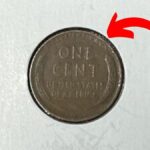Among the countless pennies circulating in America today, one particular coin stands out as an extraordinary treasure – the Lincoln Wheat Penny, with some rare specimens valued at an astounding $230,000. What makes this story even more fascinating is that some of these valuable coins might still be hiding in plain sight, waiting to be discovered in someone’s pocket change or coin jar.
Birth of an American Icon
The story begins in 1909 when the United States Mint introduced the Lincoln Wheat Penny to commemorate the 16th President’s legacy. This coin marked a significant milestone in American numismatic history as the first U.S. currency to feature a real person rather than symbolic figures. The distinctive design, featuring Lincoln’s profile on one side and wheat stalks on the reverse, would become an enduring symbol of American coinage.
The Wartime Mystery
During World War II, a fascinating chapter in the penny’s history unfolded. In 1943, the government ordered pennies to be made from steel instead of copper to support the war effort. However, a small number of bronze pennies were accidentally struck that year, creating what would become one of the most valuable mistakes in coin history.
Value and Rarity
The extraordinary value of certain Lincoln Wheat Pennies stems from multiple factors. Minting errors, limited production runs, and special mint marks all contribute to their worth. The 1943 bronze penny, in particular, stands out as one of the most valuable, with well-preserved specimens commanding prices over $230,000.
The Hunt Continues Despite
decades of collecting, some of these valuable pennies remain in circulation. They might be sitting forgotten in old cookie jars, piggy banks, or family coin collections. This possibility keeps collectors and casual observers alike checking their change, hoping to make the discovery of a lifetime.
Identifying a Valuable Specimen
For those hoping to find a valuable Lincoln Wheat Penny, several key characteristics must be checked. The date is crucial, with years like 1909-S VDB, 1914-D, and the 1943 bronze being particularly significant. Mint marks can also dramatically affect value, with certain combinations of years and marks being especially rare.
The Magnetic Test
One simple way to identify a potentially valuable 1943 penny is the magnet test. Since the standard 1943 pennies were made of steel, they will stick to a magnet. However, if you find a 1943 penny that doesn’t stick, you might have one of the rare bronze specimens worth a small fortune.
Condition Matters
The state of preservation plays a crucial role in a coin’s value. Well-preserved specimens with clear details and minimal wear command the highest prices. Even common date Lincoln Wheat Pennies can be worth more than their face value if they’re in excellent condition.
Historical Significance
Beyond their monetary value, these pennies represent an important piece of American history. They tell the story of a nation during wartime, of technological changes, and of the evolution of American currency. Each coin is a tangible connection to the past.
The Modern Market
Today’s collectors eagerly seek these rare pennies, driving prices higher as demand outpaces the extremely limited supply. Professional coin grading services help authenticate valuable specimens, providing certainty in a market where authenticity is crucial.
Future Prospects
As time passes, these rare pennies may become even more valuable. Their historical significance, combined with their scarcity, suggests that prices could continue to rise. This makes the prospect of finding one even more exciting for today’s treasure hunters.
A Lasting Legacy
The Lincoln Wheat Penny’s story reminds us that extraordinary value can hide in ordinary places. Whether or not you find a $230,000 penny, the search itself connects us to American history and the enduring appeal of numismatic treasure hunting.

























